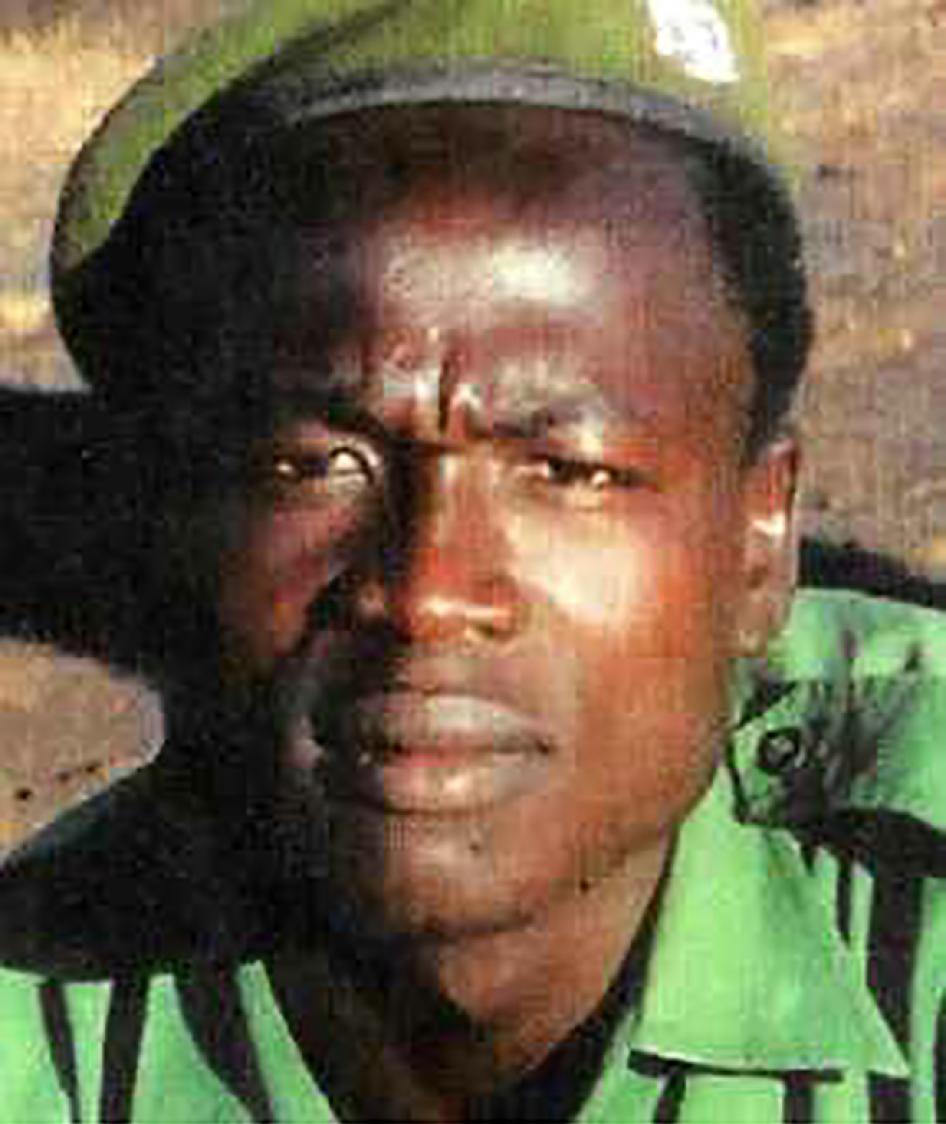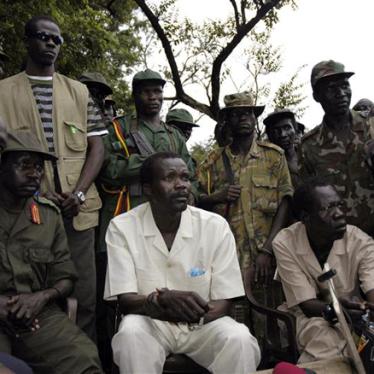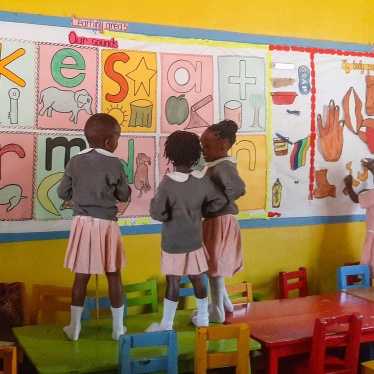1. What is the Lord’s Resistance Army?
3. How did the ICC come to bring charges against Ongwen?
4. What are the charges against Ongwen?
5. What are Ongwen’s rights as a suspect?
6. What is the role of victims in Ongwen’s case?
8. How does Ongwen’s experience as a child soldier affect judicial proceedings against him?
9. Could Ongwen be tried by domestic courts in Uganda?
10. How has Uganda addressed serious abuses by the LRA and its own military?
11. Could the ICC or other countries prosecute Ongwen for alleged crimes committed outside Uganda?
12. What is Uganda’s position on the ICC?
13. Is the ICC targeting Africa?
The Lord’s Resistance Army is an armed rebel group led by Joseph Kony. Organized in about 1987, it initially fought the Ugandan government in northern Uganda, with incursions into South Sudan.
Ugandan military operations forced the group out of Uganda in 2005 and 2006. After that, the LRA gradually became a regional threat, operating in the remote border areas between southern Sudan, the Democratic Republic of Congo, and the Central African Republic. Human Rights Watch documented the killings of more than 2,600 civilians and abductions of over 4,000 others by the LRA in northeastern Congo, Central African Republic, and South Sudan between 2008 and 2012. More than 400,000 people were displaced from their homes in this region because of LRA attacks.
Throughout its history, the LRA has been responsible for numerous atrocities, including massacres, summary executions, torture, rape, pillage, and forced labor. The LRA’s brutality against children has been particularly horrific. The group has replenished its ranks by abducting children, forcibly training and using children in combat operations, using girls as sex slaves, and compelling compliance through threats, violence, and mind control.
While the group has become weaker in recent years, LRA fighters continue to conduct smaller-scale attacks in northeastern Congo and the Central African Republic.
Ongwen is from northern Uganda. According to his family, he was born in 1980 and was abducted by the Lord’s Resistance Army on his way to school in 1990, at age 10. Senior LRA leaders gave him military training and he eventually became known as one of the LRA’s more ruthless commanders.
After LRA forces left northern Uganda in 2005 and 2006, troops under Ongwen’s command repeatedly terrorized communities in Congo’s Haut Uele and Bas Uele districts. They were responsible for some of the LRA’s most vicious attacks in the following years, including the Makombo massacre in 2009, when troops under Ongwen’s command killed at least 345 civilians and abducted another 250, including at least 80 children, during a four-day rampage in the Makombo area of northeastern Congo. This was one of the worst massacres committed during the LRA’s long, brutal history.
In December 2003, Uganda referred the situation of the Lord’s Resistance Army to the ICC. In July 2004, the ICC prosecutor announced that the ICC was opening an investigation into the situation in northern Uganda. In July 2005, the ICC issued sealed arrest warrants for war crimes and crimes against humanity for the LRA’s top five leaders at that time: Joseph Kony, Vincent Otti, Okot Odhiambo, Raska Lukwiya, and Dominic Ongwen. The warrants were unsealed in October 2005. Lukwiya was killed in 2006 and Otti in late 2007. Odhiambo may have been killed in more recent fighting, Ugandan officials said.
Kony remains at large, and his fighters remain a serious threat to civilians in the border region between the Central African Republic, South Sudan, and northeastern Congo.
The ICC initially charged Ongwen with criminal responsibility for crimes committed in northern Uganda in 2004 at the camp for internally displaced people at Lukodi -- three counts of crimes against humanity and four counts of war crimes.
In September 2015, the prosecutor gave notice of additional charges. These include murder, torture, enslavement, and pillage as part of attacks on four camps for internally displaced people: Pajule, Odek, and Abok, in addition to Lukodi. Added charges also include persecution, sexual and gender-based crimes, and conscription and use of child soldiers in northern Uganda.
A confirmation of charges proceeding in Ongwen’s case will begin on January 21 and is expected to last five days. The prosecutor is required to present sufficient evidence to establish substantial grounds that the defendant committed the crime for the charges to be confirmed and the case to proceed to trial.
Under international fair trial standards such as those found in the International Covenant on Civil and Political Rights and the ICC’s Rome Statute, Ongwen is entitled to:
- have information about the charges against him in a language he understands;
- a presumption of innocence;
- adequate time and facilities to prepare a defense;
- not be compelled to testify against himself or to confess guilt;
- have a lawyer of his own choosing; and
- be protected from torture and cruel, inhuman, or degrading treatment or punishment.
A total of 2,026 victims are currently recognized as “participants” in Ongwen’s case at the ICC. Victim participation is a unique feature of the ICC among international courts, which allows victims to express views and concerns separately from any role as witnesses. Victim participation is one way to enhance the ICC’s resonance in affected communities. The victim participants will be represented by counsel at the confirmation of charges hearing.
- How will local communities that were affected by the crimes in northern Uganda receive information about the confirmation of charges proceeding?
The ICC will coordinate livestreaming of the confirmation of charges proceeding in eight communities in northern Uganda that have been affected by the alleged crimes, as well as broadcasting them on local radio. There will be news conferences in Kampala and Gulu. Outreach in the affected communities is important to maximize the court’s impact locally.
In situ proceedings can also help make the ICC’s work more accessible to the communities affected by the crimes, and the court considered holding Ongwen’s confirmation of charges hearing in Uganda. However, the ICC judges ultimately determined that the possible security risks and financial costs outweighed the possible benefits in this instance.
Ongwen is believed to be the only former child abductee to face charges before the ICC. During its history, the LRA abducted at least 30,000 children into its ranks, in large part because they are easier to manipulate than adults. Through mind-control methods that instill fear, and sheer brutality, the LRA has initiated children into the group and forced them to undergo what they call “military training.” Children were often forced to kill adults or other children who fail to obey the LRA’s strict rules or who try to escape.
The ICC’s Rome Statute does not provide jurisdiction over crimes committed by someone under 18, but Ongwen can be tried for the crimes he committed as an adult. His status as a child abductee could be a mitigating factor during sentencing in the event of trial and conviction, and may also be relevant to his legal defense.
The ICC is a court of last resort. Under the Rome Statute, the ICC only prosecutes cases when national courts are unable or unwilling to prosecute. Once a case has been taken up by the court, as in the Ongwen case, it would only revert to national courts on the basis of what is known as an admissibility challenge, in which a country can show that it is investigating and prosecuting him for the same crimes.
In 2011 Uganda officially established an International Crimes Division to try war crimes, crimes against humanity, and other crimes. Although national trials could make an important contribution to securing justice for crimes committed during the conflict in northern Uganda, serious legal obstacles have emerged that call into question whether the division can fulfill its potential as a meaningful forum to ensure accountability.
The only case related to the conflict in northern Uganda that has been brought before the International Crimes Division is against Thomas Kwoyelo, a former LRA fighter captured in Congo in March 2009, who is charged with war crimes. Kwoyelo’s trial was stopped after Uganda’s Constitutional Court concluded that he had been treated unequally under the country’s Amnesty Act (see below). In April 2015, Uganda’s Supreme Court overruled the earlier decision and ordered the trial to move forward, but no proceedings have taken place since.
In 2000, the Ugandan government enacted an amnesty for Ugandan citizens, including LRA fighters, involved in an armed rebellion if they renounced their involvement. As of 2012, more than 12,906 people affiliated with the LRA had been granted amnesty, including a number of former high-ranking LRA commanders. Amnesty for war crimes and crimes against humanity violates international law, which rejects immunity from prosecution for the gravest crimes.
Kwoyelo is the only former LRA fighter in prison in Uganda facing charges for LRA activity. A senior commander of the LRA, Ceasar Achellam, has been in Ugandan military custody since May 2012 and his status is not known. International law requires that a person held for a criminal offense be promptly charged or released. A domestic warrant for his arrest for war crimes has been pending in Uganda since November 2013, but has never been acted on.
The Ugandan army has said that Ugandan soldiers who committed abuses during the conflict have been prosecuted and convicted, though it has been unwilling to provide details of such cases.
Human Rights Watch has documented abuses by the Ugandan armed forces over the course of its 25-year armed conflict with the LRA, including torture, rape, arbitrary detention, unlawful killings, and forced displacement of its citizens into camps with no protection and minimal humanitarian assistance. These crimes have very rarely been prosecuted. Human Rights Watch is aware of some instances in which soldiers were executed for crimes against civilians during the LRA conflict, following a guilty verdict in a summary court martial proceeding. Defendants had no right to appeal, and Uganda’s Constitutional Court has ruled such executions unconstitutional. Human Rights Watch opposes the death penalty in all circumstances because of its inherent cruelty.
At least some former LRA fighters, including some senior commanders, have been integrated into the Ugandan military and are actively deployed in the counter-LRA effort, without any investigation into crimes they may have committed during their time in the LRA.
There are no pending charges by the ICC or any domestic jurisdiction against Ongwen or other LRA leaders for alleged crimes outside of Uganda. The ICC prosecutor should consider adding charges related to serious crimes committed in those countries where the ICC has jurisdiction, such as the Democratic Republic of Congo. These cases could also be pursued by domestic authorities in the countries where the alleged crimes occurred. More discussion of these issues is available at: https://www.hrw.org/sites/default/files/reports/drc0310webwcover_0.pdf.
Uganda is a state party to the ICC’s Rome Statute and was the first country to request an ICC investigation. The ICC has worked in Uganda for many years, carrying out investigations and holding outreach meetings with victims’ groups.
Since 2009, when the ICC issued an arrest warrant for President Omar al-Bashir of Sudan for crimes in Darfur, the court has faced hostility from some African leaders. This backlash increased in 2013 when Uhuru Kenyatta and William Ruto, both accused by the ICC of crimes committed during Kenya’s 2007-2008 post-election violence, were elected president and deputy president of Kenya. The case against Kenyatta was dropped in late 2014. President Yoweri Museveni of Uganda has supported criticism of the ICC and suggested pushing for withdrawal by African countries from the ICC, but has indicated Uganda will cooperate with the ICC on Ongwen’s case.
Thirty-four African countries are members of the ICC, and the ICC continues to benefit from support by many of those countries.
Since it began operations in 2003, the ICC’s investigations have concerned eight African countries. However, in five countries where the ICC is conducting investigations – Central African Republic, Côte d’Ivoire, Democratic Republic of Congo, Uganda, and Mali – the investigations arose through a request or a grant of jurisdiction by the concerned governments. In two other countries – Sudan for Darfur, and Libya – the ICC prosecutor acted only following a UN Security Council referral. For Kenya, the ICC Office of the Prosecutor received the authorization of an ICC pre-trial chamber to open an investigations.
While the ICC is not targeting Africans, international justice has been applied unevenly. Powerful countries and their allies have been able to evade the reach of justice when serious crimes are committed on their territories. This is due at least partly to the role of the UN Security Council in determining which situations to refer to the ICC when serious crimes are committed in countries that are not ICC members and that some countries have not joined the ICC. Human Rights Watch campaigns for justice wherever serious crimes are committed and for justice to advance irrespective of political considerations. Independent organizations across Africa have called for African leaders to work to support the ICC, and not to undermine it.
The ICC is conducting preliminary examinations in multiple situations outside Africa, including Palestine, Colombia, and Afghanistan. In October 2015, the ICC prosecutor sought authorization to open an investigation into crimes committed in Georgia. If approved, this would be the ICC’s first investigation outside Africa.








